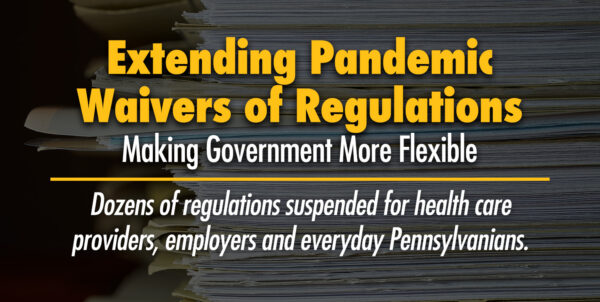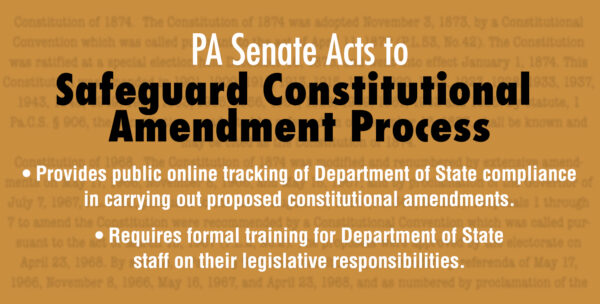
|
||||
|
In this Update:
Pittman’s Bills Supporting Physician Assistants Head to GovernorThis past week the state Senate unanimously approved two of my bills, with those bills focused on helping physician assistants work and practice with increased efficiency in Pennsylvania. Pennsylvania is one of the premier states for physician assistant education with more than 20 programs currently in the state. While many physician assistants receive their education from programs here, current law makes it less appealing for them to stay in Pennsylvania. These bills will reform the law to encourage more physician assistants to practice in the Commonwealth, which will enhance the diverse range of medical professionals across our healthcare delivery system. Senate Bill 397 amends the Osteopathic Medical Practice Act and Senate Bill 398 amends the Medical Practice Act of 1985, with some of the changes being the elimination of the requirement for a physician assistant to provide medical care and services under the direction of a physician, who instead will supervise the activities of the physician assistant as they provide medical services as spelled out in a written agreement with the supervising physician. The two bills also streamline the written agreement, which will now identify the primary supervising physician, describe the physician assistant’s scope of practice and describe the nature and degree of supervision the primary supervising physician will provide the physician assistant. Additionally, the two bills increase the ratio of the number of physician assistants a physician can supervise from four to six in all practice settings, and they prohibit an employer or entity from requiring a physician to supervise more physician assistants when the physician, in his or her clinical judgement, determines that supervising more physician assistants will negatively impact patient care or the supervision of other physician assistants. Senate Bills 397 and 398 are now awaiting action by the governor. Audio of Senator Pittman’s comments about the bills. Legislature Approves Extension of Pandemic Waivers of Government Regulations
The Senate voted to extend waivers of an array of regulatory statutes, rules and regulations to aid in Pennsylvania’s recovery from the COVID-19 pandemic. The bill was approved by the House of Representatives and signed into law. The waivers affecting health and human services, as well as consumers and employees, were due to expire Thursday. Enactment of the legislation would extend the waivers until March 31, 2022. In May, voters stripped Gov. Tom Wolf of the authority he claimed to extend emergency declarations without approval of the General Assembly. Delivering on a promise to the people that we work better together, the General Assembly initially extended these waivers as part of the budget in June. Approval of the following waivers is critical to providing flexibility in managing the pandemic during a workforce shortage crisis: Waivers Benefiting Consumers and Employees
Waivers Aiding the Work of Health Care Facilities and Services
Senate Acts to Prevent Repeat of Botched Constitutional Amendment Process
The Senate approved two measures aimed at preventing a repeat of the Pennsylvania Department of State’s devastating failure to carry out a proposed constitutional amendment to help victims of sexual abuse. In the 2019-20 session, the General Assembly approved a proposed constitutional amendment, which would have given voters the opportunity to decide if a two-year window for victims of childhood sexual abuse to file litigation against their abusers should be created. The Department of State admitted earlier this year that it failed to properly advertise the proposed constitutional amendment, preventing the issue from going before voters and forcing the entire effort to be restarted. One measure would require the Department of State to create a publicly accessible website to provide Pennsylvanians a transparent way to track every step of the constitutional amendment process, including:
A second bill would require formal training for the Department’s employees regarding their legislative responsibilities and the constitutional amendment process. A 68-page Inspector General report on the botched handling of the constitutional amendment showed that some Department of State staff lack the formal training needed to properly handle their responsibilities with legislation. Both bills now go to the House of Representatives for consideration. Program to Battle Opioid Abuse Extended by Senate
The Senate approved a bill that continues a program designed to help doctors and pharmacists battle opioid abuse. The program, set to expire on June 30, 2022, would be extended until Dec. 31, 2028. The bill now goes to the governor for enactment. The measure extends the successful Achieving Better Care by Monitoring All Prescriptions (ABC-MAP) program that allows access to a patient’s prescription medication history through an electronic system to those who prescribe medications and those who dispense medication. Electronic access to a patient’s prescription medication history allows doctors, pharmacists and other medical professionals to better treat patients. ABC-MAP enables opioid prescribers and dispensers to identify warning signs of abuse including “doctor shopping” and “pharmacy shopping” that occurs when patients attempt to obtain opioid prescriptions from multiple doctors or pharmacies. Senate Passes Measures to Help Pennsylvania Farmers Move Goods
The Senate passed two measures to help Pennsylvania farmers make home deliveries and meet other transportation needs. The bills were sent to the House of Representatives for consideration. One bill would enable a farmer to register a farm vehicle for the delivery of milk and other agricultural products to both businesses and homes. Under current law, a farmer is required to purchase, register and maintain a separate commercial vehicle for home deliveries while also maintaining a farm vehicle to deliver products to businesses. Another measure would allow farmers to use a Class A, B or C driver’s license when operating farm vehicles with a combined weight of more than 26,000 pounds on roadways. Act 170 of 2014 clarified that farmers did not need a Commercial Driver’s License (CDL) when operating farm trucks, or farm trucks hauling trailers, with a combined weight of more than 26,000 pounds. However, it was unclear as to whether a farmer could use a Class B, Class C or Class A driver’s license when operating those vehicles. A Class A driver’s license is a graduated license above the common Class C license and requires an additional road test and fee. Domestic Violence: Identifying the Signs and Getting Help
October is National Domestic Violence Awareness Month. Help is available if you’re experiencing abuse or concerned about a friend or family member: Call: 1-800-799-7233 (SAFE) Text: START to 88788 Chat: At National Domestic Violence Hotline You can find out how to identify abuse, plan for your safety or help others. You don’t have to take it, and you don’t have to suffer in silence. |
||||
|
||||




2024 © Senate of Pennsylvania | https://senatorpittman.com | Privacy Policy |





